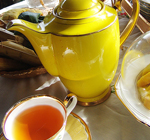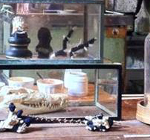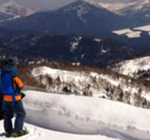
Tea at Jon's House in Kampung Ayer
I have heard about this house in many occasion from Jon the owner himself and he had promised to invite me over someday when he is in town. Pengiran Suhaimi or also ...
More
Photos © Liechtenstein Tourismus
Brunei Darussalam recently established diplomatic ties with the Principality of Liechtenstein on 15th November, 2011. Brunei Darussalam will be represented by Pehin Dato Inderasugara Brigadier General (B) Dato Paduka Hj Mohd Yusof Abu Bakar, the Ambassador of Brunei Darussalam to Germany. Liechtenstein will be represented by His Serene Highness Prince Stefan, the Ambassador of Liechtenstein to Germany. Like Brunei, Liechtenstein is known to be small in size in their region but again, like Brunei, there is much more to the country to discover. So, let's learn a little about Liechtenstein, her people, her landscape, her unique qualities and last but not least, how to pronounce the name. Properly.
The petite Principality of Liechtenstein (pronounced lik-tern-styne) is a land-locked country situated in between Switzerland and Austria. It is only 160 square kilometres and its size has earned it the title of the fourth smallest state in Europe after the Vatican, Monaco and San Marino. The cosy population of 35,356 residents is headed by Prince Hans-Adam II but Liechtenstein is a constitutional, hereditary monarchy on a democratic and parliamentary basis. The capital of Liechtenstein is Vaduz and their official language is standard German. Its location right in the heart of Europe is accessed by the neighbouring countries as it has no airport nor seaport.
The Reigning Prince and the princely family . The Princely House of Liechtenstein is one of the oldest noble families in Europe and a very successful entrepreneurial family. The Princely Art Collections are among the most important private art collections in the world and include major works of European art covering over four centuries. In 1938, the Reigning Prince Franz Josef moved his residence to Vaduz, and his son, Reigning Prince Hans-Adam II, is the first Reigning Prince to have been born in Liechtenstein.

During the 20th century, especially after the Second World War, Liechtenstein developed from a predominantly agricultural country into a modern industrial and services state. Their people are linked with the entire world via their internationally oriented and globally networked economy. Liechtenstein has a very diversified economic structure. Besides being an important financial centre in the world, their industrial sector is internationally competitive with high-quality products and an important sector alongside trade, agriculture, forestry and tourism sectors.
Despite its small size, Liechtenstein offers a diverse landscape. Of all the countries in the Alpine arc extending from France to Slovenia, the Principality is the only country situated entirely in the Alps. The floor of the Rhine valley covers half of Liechtenstein - that's where the townships are located - and the other half is mountainous, and the country gets a relatively mild climate. Three types of landscape can be distinguished: The Rhine Valley, the slopes facing the Rhine Valley and the Alpine region. Each of these landscapes has its own unique flora and fauna, inviting naturalists and hiking enthusiasts to these parts.

The glorious mountains provide the residents and tourists with some of the most challenging and enjoyable sporting activities there. Skiing is their national sport and the country has produced several world and Olympic champions for a small nation. The diverse and untouched nature is the country's attraction to tourists seeking nature recreation and sports. People here love their sports. Interestingly, over 15,000 people out of its 35,356 inhabitants are enrolled in a sporting association or club, and that corresponds to 45% of the country. The state promotes sporting activities and sports clubs, which make facilities, equipment, training opportunities and coaches available to their members. The government pays close attention to sports in schools and the curricula of all levels of schooling include sports for students. 

Although Liechtenstein is a small nation, it is open to the world and reaching out to charm with its landscape, people and culture. They have even introduced the Liechtenstein Brand in 2004 with the goal of symbolically representing the values and qualities that make up Liechtenstein's distinctive characteristics in a clearly recognisable way, so the world will know: Good things do come in small sizes.
(Ed: During our research, we poured over their national websites that provide information and photo galleries of their country. As a bunch of branding designers, we are most impressed with the way Liechtenstein has branded itself and we must say that they are doing a super branding job in presenting and promoting themselves with a very simple, tasteful, clear and consistent identity throughout.)

Tea at Jon's House in Kampung Ayer
I have heard about this house in many occasion from Jon the owner himself and he had promised to invite me over someday when he is in town. Pengiran Suhaimi or also ...
More

Weird and wonderful in Paris
In a study comparing major metropolises, Paris came in third for the most number of museums, behind London and Berlin. The crowning jewel is La Musée du Louvre, ...
More

Chasing snow in Japan
It's very apparent that I was catching the last dredges of melting snow at Mt. Racey in Hokkaido's Yubari district before spring and cherry blossoms hit Japan in ...
More